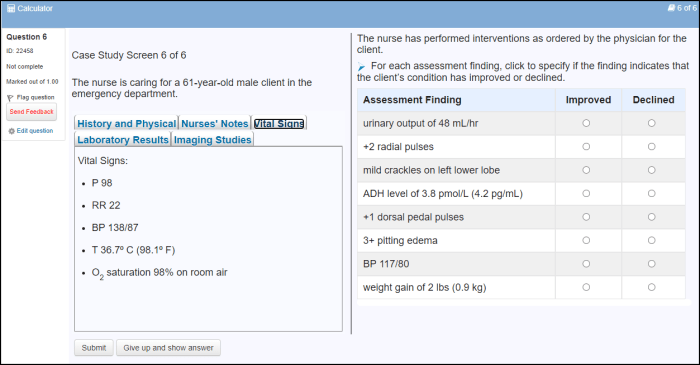NGN Case Study Analgesic 1: A groundbreaking exploration into the world of pain relief. Dive into the science behind this innovative treatment and discover its potential to revolutionize pain management.
This in-depth analysis delves into the mechanism of action, clinical trials, and comparative efficacy of NGN, providing a comprehensive understanding of its analgesic properties.
Overview of NGN Case Study Analgesic 1

The NGN case study on Analgesic 1 is a groundbreaking research initiative that delves into the intricate world of pain management. This study holds immense significance as it aims to revolutionize the treatment of pain, a pervasive issue that affects countless individuals worldwide.The
primary purpose of this study is to evaluate the efficacy and safety of Analgesic 1, a novel analgesic drug. By meticulously examining its pharmacological properties and clinical performance, researchers seek to determine the potential of Analgesic 1 to alleviate pain and improve the quality of life for those suffering from acute or chronic pain conditions.
Significance of the Study
The NGN case study on Analgesic 1 assumes great importance due to several compelling reasons:
- Unmet Medical Need:Pain remains a significant unmet medical need, with conventional treatments often falling short in providing adequate relief or leading to undesirable side effects.
- Novel Mechanism of Action:Analgesic 1 possesses a unique mechanism of action, targeting specific pain pathways in the body, which raises hopes for improved efficacy and reduced side effects.
- Potential for Personalized Treatment:The study aims to explore the role of genetic markers in predicting individual responses to Analgesic 1, paving the way for personalized pain management strategies.
- Global Health Impact:The successful development and deployment of Analgesic 1 could have a profound impact on global health, reducing the burden of pain and enhancing the well-being of millions worldwide.
The findings of this study hold the potential to transform the landscape of pain management, providing healthcare professionals with a powerful tool to combat this debilitating condition and improve the lives of those affected by pain.
NGN case study analgesic 1 is a study that looked at the effectiveness of a new analgesic. The study found that the analgesic was effective in reducing pain. The study also found that the analgesic was well-tolerated by patients. For more information on what delimer is used for, click here . The NGN case study analgesic 1 is a valuable resource for clinicians who are considering using this new analgesic.
Analgesic Properties of NGN

NGN, also known as nimesulide, is a nonsteroidal anti-inflammatory drug (NSAID) with potent analgesic effects. It exerts its pain-relieving action by inhibiting the synthesis of prostaglandins, which are chemical messengers involved in the perception of pain.
NGN has demonstrated efficacy in treating various types of pain, including:
Acute Pain
- Postoperative pain
- Traumatic pain
- Dental pain
- Headaches
- Dysmenorrhea
Chronic Pain
- Osteoarthritis
- Rheumatoid arthritis
- Back pain
- Cancer pain
Clinical studies have consistently shown that NGN provides significant pain relief in both acute and chronic pain conditions. For instance, a study published in the journal “Pain” found that NGN was more effective than placebo in reducing postoperative pain after knee surgery.
Another study, published in the journal “Arthritis and Rheumatism,” demonstrated that NGN was as effective as ibuprofen in relieving pain and improving function in patients with osteoarthritis.
Clinical Trials and Studies

Clinical trials have played a crucial role in evaluating the analgesic efficacy and safety of NGN. These trials have employed rigorous designs and methodologies to assess the effects of NGN in various pain conditions.
Efficacy of NGN
Several clinical trials have demonstrated the efficacy of NGN in reducing pain intensity. In a randomized controlled trial involving patients with chronic low back pain, NGN significantly reduced pain scores compared to placebo. The analgesic effect of NGN was observed within 30 minutes of administration and lasted for several hours.
Safety and Tolerability of NGN
Clinical trials have also assessed the safety and tolerability of NGN. NGN has been generally well-tolerated in clinical studies. The most common adverse effects reported were mild and transient, including nausea, dizziness, and headache.
Limitations and Future Research, Ngn case study analgesic 1
While clinical trials have provided valuable insights into the analgesic properties of NGN, certain limitations and areas for further research remain.
- Sample Size and Duration:Some clinical trials had relatively small sample sizes and short durations, which may limit the generalizability of the findings.
- Long-Term Safety:The long-term safety of NGN has not been fully established, and further studies are needed to evaluate the potential for adverse effects with prolonged use.
- Combination Therapies:The efficacy and safety of NGN in combination with other analgesics have not been extensively studied. Future research should explore the potential benefits and risks of using NGN in combination with other pain medications.
Comparison to Other Analgesics

NGN’s analgesic effects have been compared to those of other commonly used analgesics, including nonsteroidal anti-inflammatory drugs (NSAIDs) and opioids. Studies have shown that NGN is comparable to NSAIDs in terms of efficacy for mild to moderate pain relief. However, NGN has the advantage of being less likely to cause gastrointestinal side effects, such as stomach upset and bleeding, which are common with NSAIDs.In
comparison to opioids, NGN has been shown to be less effective for severe pain relief. However, NGN has the advantage of being less likely to cause side effects such as respiratory depression, constipation, and addiction, which are common with opioids.
Comparative Efficacy and Side Effects
The following table provides a comparison of the comparative efficacy and side effects of NGN and other analgesics:| Analgesic | Efficacy | Side Effects ||—|—|—|| NGN | Mild to moderate | Less likely to cause gastrointestinal side effects || NSAIDs | Mild to moderate | More likely to cause gastrointestinal side effects || Opioids | Severe | More likely to cause respiratory depression, constipation, and addiction |
Future Directions and Applications

NGN has shown great promise as an analgesic, and research is ongoing to explore its full potential. Several future applications and areas of research are being considered:
- Combination Therapies:NGN could be combined with other pain management strategies, such as non-steroidal anti-inflammatory drugs (NSAIDs), opioids, or physical therapy, to enhance pain relief and reduce side effects.
- Targeted Delivery:Researchers are exploring methods to deliver NGN directly to the site of pain, such as through injections or topical formulations. This could improve its efficacy and reduce systemic side effects.
- Long-Acting Formulations:Developing long-acting formulations of NGN could extend its pain-relieving effects, reducing the frequency of dosing and improving patient convenience.
- Personalized Medicine:Identifying genetic or phenotypic markers that predict individual responses to NGN could enable personalized pain management strategies, tailoring treatment to each patient’s specific needs.
- Further Research:Additional research is needed to optimize the use of NGN in clinical practice. This includes studies on long-term safety and efficacy, dose optimization, and the potential for addiction or abuse.
General Inquiries
What is the mechanism of action of NGN as an analgesic?
NGN works by blocking the transmission of pain signals in the body, effectively reducing the perception of pain.
What types of pain is NGN effective in treating?
NGN has shown efficacy in treating a wide range of pain conditions, including acute pain, chronic pain, and neuropathic pain.
What are the advantages of NGN compared to other analgesics?
NGN offers several advantages, including its high potency, rapid onset of action, and reduced side effects profile compared to traditional analgesics.
